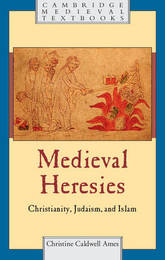
|
Medieval Heresies: Christianity, Judaism, and Islam
Hardback
Main Details
| Title |
Medieval Heresies: Christianity, Judaism, and Islam
|
| Authors and Contributors |
By (author) Christine Caldwell Ames
|
| Series | Cambridge Medieval Textbooks |
|---|
| Physical Properties |
| Format:Hardback | | Pages:368 | | Dimensions(mm): Height 223,Width 144 |
|
| Category/Genre | History of religion |
|---|
| ISBN/Barcode |
9781107023369
|
| Classifications | Dewey:273 |
|---|
| Audience | | Tertiary Education (US: College) | | Professional & Vocational | |
|---|
| Illustrations |
5 Maps; 13 Halftones, unspecified
|
|
Publishing Details |
| Publisher |
Cambridge University Press
|
| Imprint |
Cambridge University Press
|
| Publication Date |
2 April 2015 |
| Publication Country |
United Kingdom
|
Description
Jews, Christians, and Muslims in the Middle Ages were divided in many ways. But one thing they shared in common was the fear that God was offended by wrong belief. Medieval Heresies: Christianity, Judaism, and Islam is the first comparative survey of heresy and its response throughout the medieval world. Spanning England to Persia, it examines heresy, error, and religious dissent - and efforts to end them through correction, persuasion, or punishment - among Latin Christians, Greek Christians, Jews, and Muslims. With a lively narrative that begins in the late fourth century and ends in the early sixteenth century, Medieval Heresies is an unprecedented history of how the three great monotheistic religions of the Middle Ages resembled, differed from, and even interrelated with each other in defining heresy and orthodoxy.
Author Biography
Christine Caldwell Ames received a BA in Russian Studies from Brown University, an MA in Church History from Yale Divinity School, and a PhD in Medieval History from the University of Notre Dame. Her training included coursework and examination fields in heresy and inquisition; medieval Iberia; Islam; medieval Judaism, and interreligious relations in the Middle Ages. Her teaching experience includes courses on medieval history, heresy and orthodoxy, Jews, Muslims, and Christians in the Middle Ages, the Crusades, medieval violence, and the history of Christianity. At the University of South Carolina, where she is an associate professor of history, Ames has received the Mortar Board Society's award for teaching. Her first book, Righteous Persecution: Inquisition, Dominicans, and Christianity in the Middle Ages (2009) investigated how friars from the Order of Preachers, the religious order most closely involved with heresy inquisitions, understood that work within their foundational pastoral and apostolic mission. She has received support from the Fulbright Scholar Program (France), the National Endowment of the Humanities, and the Mellon Foundation. Her professional memberships include the Medieval Academy, the American Society of Church History, and the American Academy of Religion. She presently serves on the award committee for the American Historical Association's James Henry Breasted Prize, which is given to the best book of history in any area before the year 1000.
Reviews'By showing that heresy can be treated within a single framework which embraces Christianity, Judaism and Islam, Caldwell Ames has in effect redefined the subject, and made an important contribution to comparative world history. In doing so she sustains a high level of learning and intellectual power and originality over a range almost as remarkable chronologically - from patristic times until the early modern period - as culturally.' R. I. Moore, Newcastle University 'Christine Caldwell Ames has written the most original and readable account of the emergence of unacceptable difference in religious belief and practice in the Abrahamic religions in the pre-modern period. She first describes the foundational differences among diaspora Judaism, Greek and Latin Christianity, and Islam between the fourth and eighth centuries. She then treats the establishment of an authoritative orthodoxy in each and the stresses within each that created different kinds of heterodoxies and different kinds of censures. Her conclusion points to several enduring consequences of these in all three religions down to the present.' Edward Peters, University of Pennsylvania 'Nothing comparable to the extant literature on Christian heresy exists for the Islamic world, while the terminological controversy - can we speak of 'orthodoxy' in Islam? - adds to the imbalance. With its comparative perspective to the three Abrahamic religions through history and its nuanced discussion of how 'heresy' is constructed and by whom, Caldwell Ames's book is a much welcome contribution that helps promote a better understanding of the Islamic case and provides stimuli for further research.' Maribel Fierro, Consejo Superior de Investigaciones Cientificas 'Christine Caldwell Ames not only provides us with a comprehensive study of heresy, or heresies, in medieval European and Near Eastern lands, but also puts forward a convincing thesis about the interplay between religious thought and social dynamics that cuts across confessional traditions.' Uriel Simonsohn, Speculum 'Undoubtedly, this is a very useful, erudite and needed book vividly showing the entangled history of religious dissent in these historical monotheisms ... Her book can be thus used in a variety of ways, ranging from pure academic interest and research to teaching and other educational purposes, especially in current times, in which the continuing relevance of these monotheistic religions and their perceptions of 'right' and 'wrong' (or 'orthodoxy' and 'heresy', if you like) in various constellations becomes more than evident and at times makes the headlines worldwide.' Vasilios N. Makrides, Entangled Religions
|